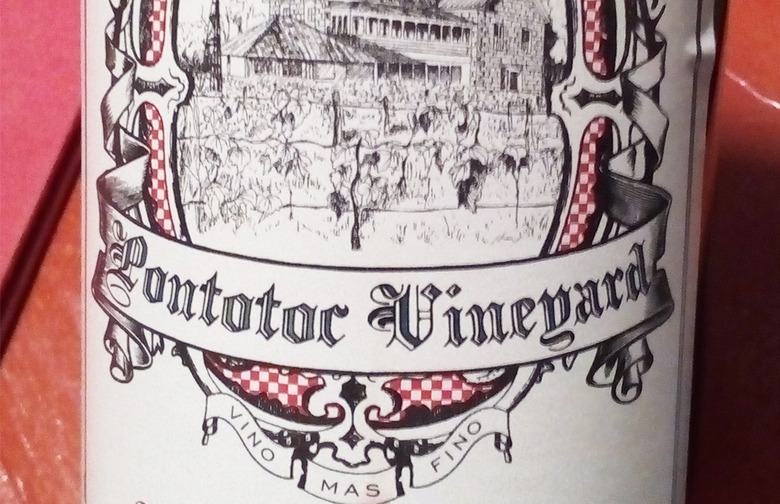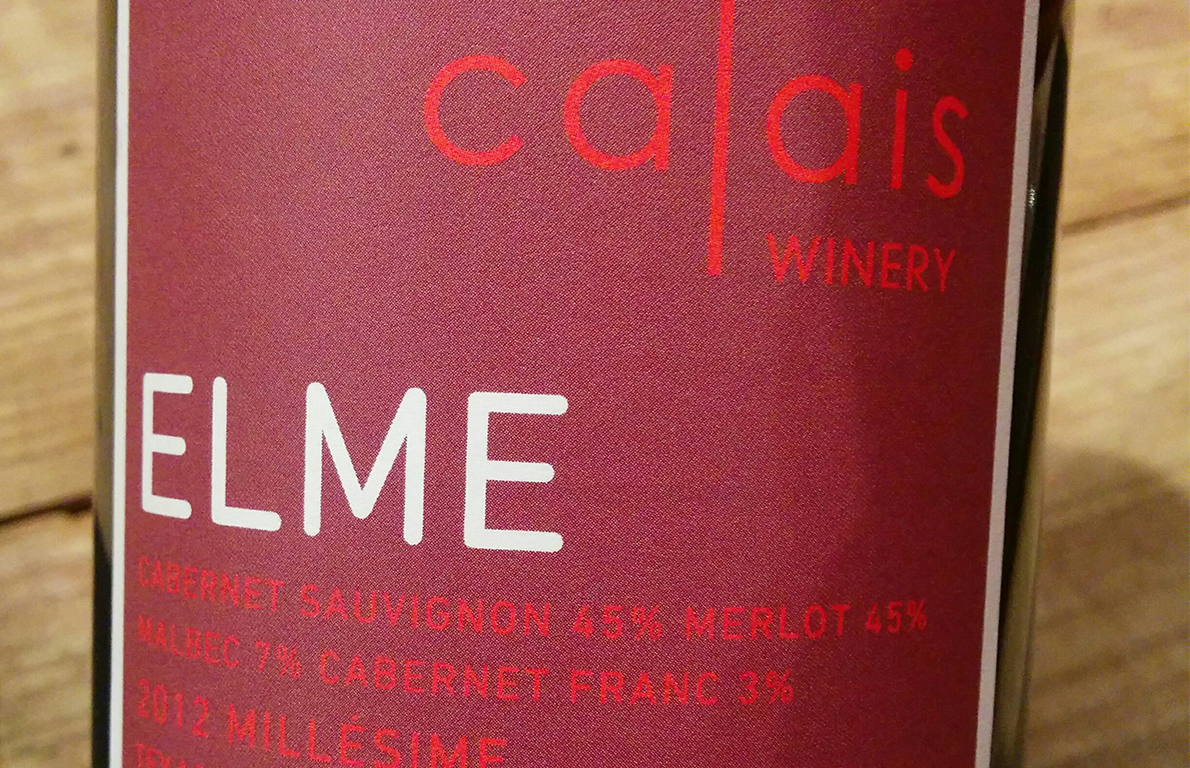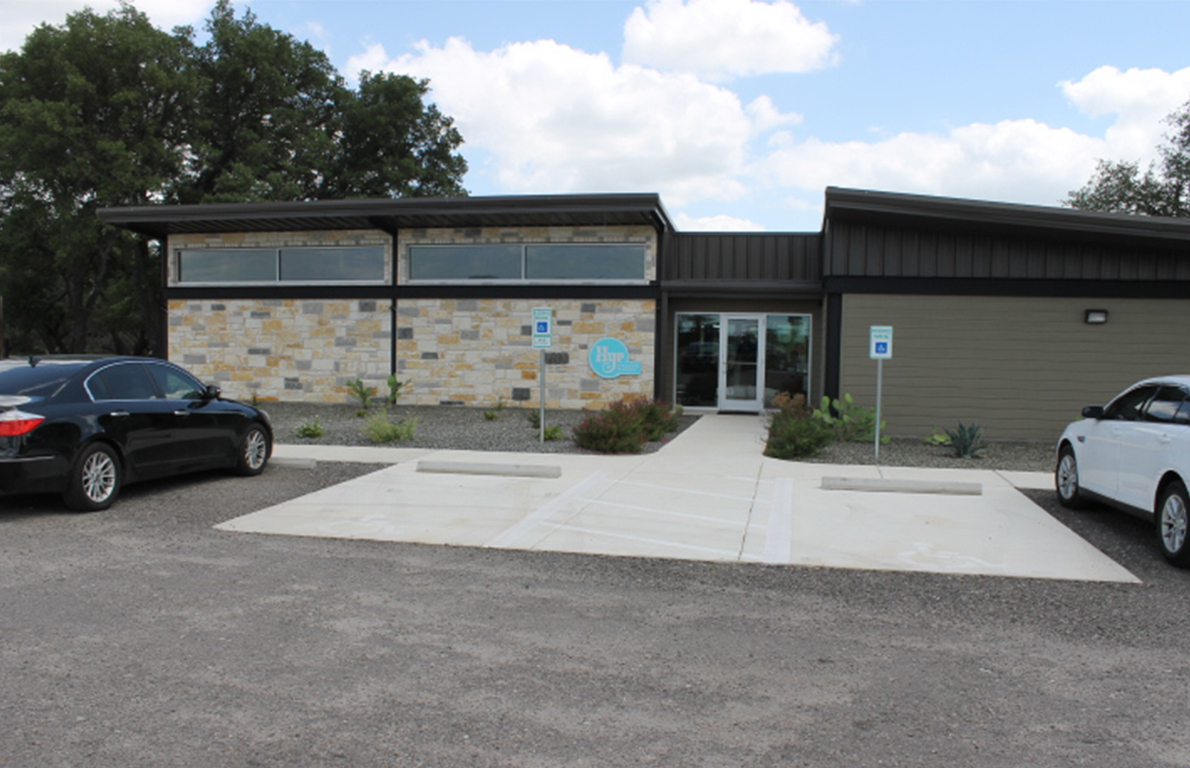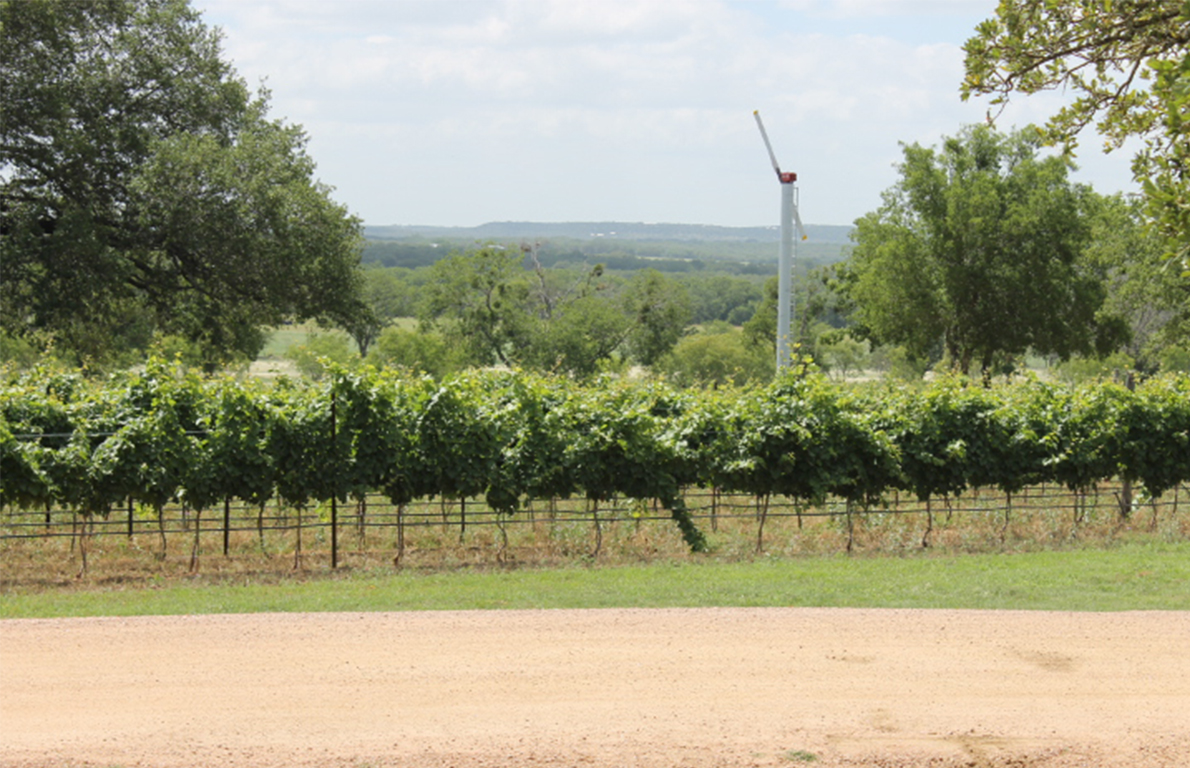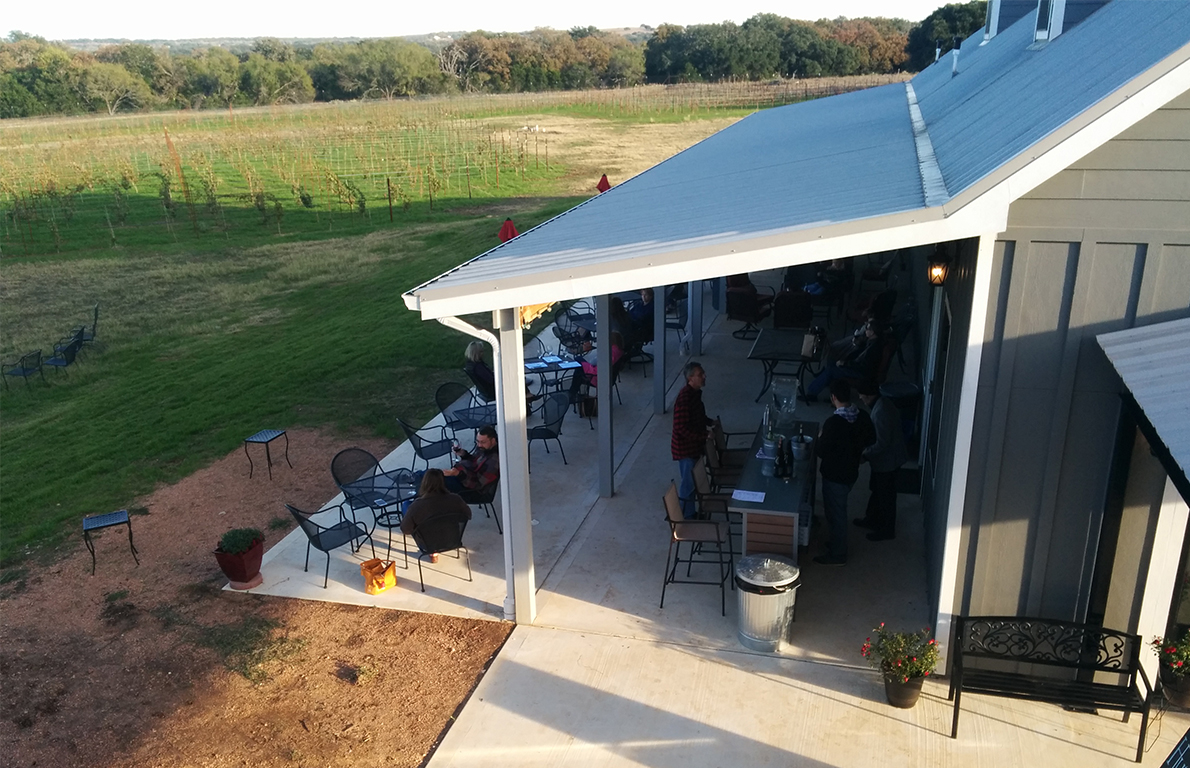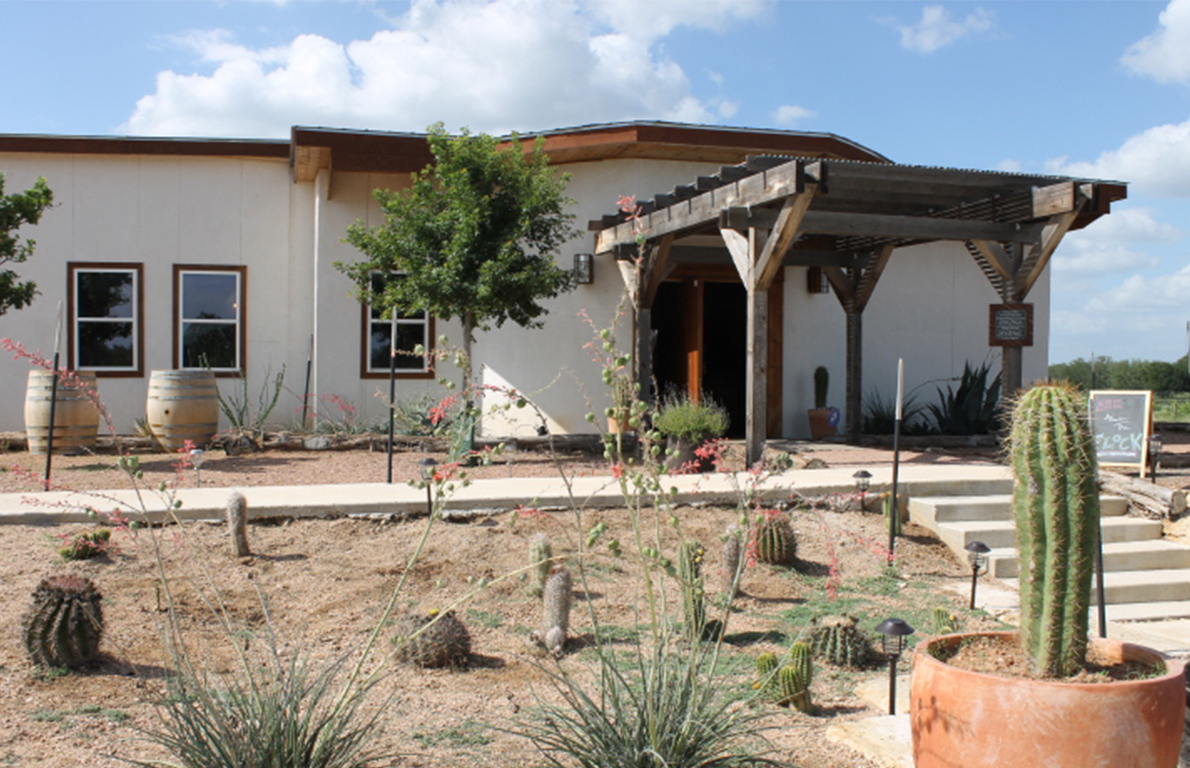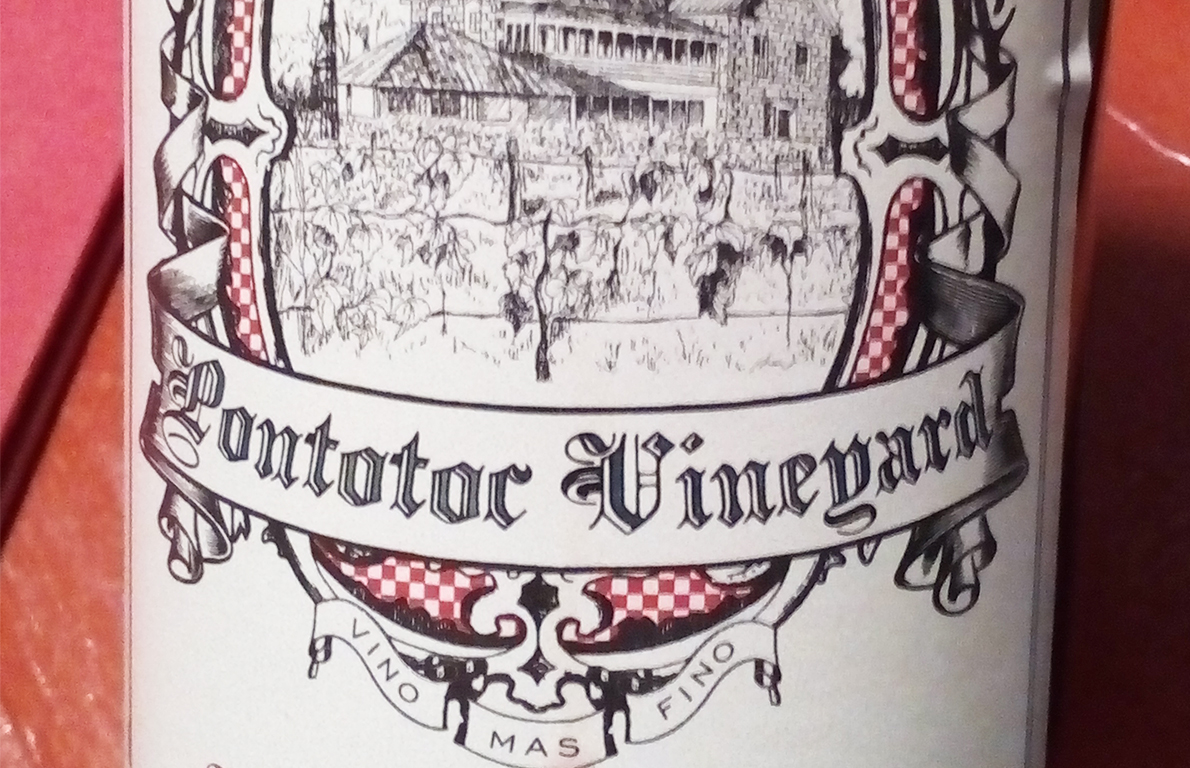The Definitive Guide To America's Most Unexpected Great Wine Destination
You have toured Napa Valley's famed Highway 29, right? The wine trail where it takes 45 minutes to cross the road in the summer (such is the volume of traffic)? Well, an attraction billing itself as the "#2 Wine Destination in America" is taking shape in central Texas. It is the 290 wine trail, or Wine Road 290. Estimates put the number of visitors at over two million people per year (compared to only 3.3 million in much-better-known Napa).
The term "290 wine trail" is my own. It refers to the stretch of U.S. 290 between Johnson City and Fredericksburg. To put that on the map, Austin and San Antonio are each about one hour away by car. The term "Wine Road 290," on the other hand, is copyrighted and owned by a corporation started by Gary Gilstrap of Texas Hills Vineyard in 2008, in cooperation with eight other wineries. Some 15 properties are now involved. From east to west, these are: Texas Hills Vineyard, Hye Meadow Winery, William Chris Vineyards, Pedernales Cellars, Woodrose Winery and Vineyards, Hilmy Cellars, Becker Vineyards, Torre di Pietra, Grape Creek Vineyards, Fiesta Winery, 4.0 Cellars, Rancho Ponte Vineyard, Lost Draw Cellars, Fredericksburg Winery, and Chisholm Trail Winery.
Wineries are eligible to join the official group if they are within five miles of Highway 290 and within 40 miles of Fredericksburg; are within the Texas Hill Country American Viticulture Area (AVA); produce at least 1,200 nine-liter cases (totaling 2,853 gallons) of wine on premises, from grapes, per calendar year; have wine-making equipment substantial enough to produce said volume at the facility; are bonded by the U.S. Alcohol and Tobacco Tax and Trade Bureau; hold a current winery permit from Texas Alcoholic Beverage Commission; maintain an operating tasting room within the Wine Road 290 designation; and participate in all WR290 events. (Not all the wineries on U.S. 290 are members of Wine Road 290.)
The stretch of U.S. 290 between Fredericksburg and Johnson City has become the Texas wine destination of choice for the state's residents, and on any summer weekend you can find yourself in a steady stream of wine tourists at any point along the route. It isn't a parking lot yet, but it is clear where the trend is heading. The asking price for frontage land along 290 has gone from about $7,000 an acre in 2005 to $75,000 an acre in 2014.
That's largely because this is where wineries want to be to meet their customers. Wherever they make wine, they are all setting up sales operations here. In March of last year, at the first Texas Hill Country Wineries symposium, the organization's executive director, January Wiese, announced that there were 16 permits for wineries along the 290 wine trail in process at that time, effectively doubling the number of wineries on the route.
Although they're only 30 miles from one another, the two towns at either end of the stretch are vastly different. The picturesque town of Fredericksburg was popular before the winery boom started in the last decade. As you walk down Main Street, there is a Chase Bank with the word "private" between the words "Chase" and "Bank." It manages the investments of the retired natural resources executives from Houston and the tech moguls from Austin. The detritus of tourism and wealth are everywhere, and growing, as the quality restaurants increase in number, and accommodations (mainly in the form of luxury B&Bs) proliferate. That said, there are simply not enough hotels for the current weekend visitor numbers, and prices reflect the shortage. On a visit this January (one of the quietest months), I found the Hampton Inn was $179 a night. Room rates were 50 percent cheaper in Kerrville, 30 minutes away. Johnson City appears to have no connection with wine or tourism (except for the Best Western on U.S. 281 just outside town). One consequence of being passed by is that retail space is cheaper than Fredericksburg and the right location could suit a new winery starting out on the 290 wine trail.
This article is about wineries on, or near, U.S. 290, regardless of whether they're members. It is an update of a similar article I wrote in 2014. An update is due because so much has changed: The number of wineries on the trail has increased by 25 percent in two years, and there is a headlong charge towards making only Texas wine, rather than reselling wine from elsewhere. As of the 2015 vintage, fully two-thirds of the wineries on the 290 wine trail make only Texas wine. The phenomenon is now so widespread that it warrants a special moniker: 100 Percent Texas Wine. A further 20 percent of the wineries plan to reach 100 percent, and are already close. That leaves just a runt group of 14 percent of wineries still peddling out-of-state juice, typically jug wine from California gussied up in Texas-looking labels.
This update is also motivated by something that motivated the first version: The absence of a consumer's guide to the 290 wine trail. Existing articles on the subject tend to be general interest travel pieces or posts by bloggers motivated by free wine and largely unconcerned that some operators package California jug wine to look like Texas wine, a practice that is legal if bottles are labeled as "For Sale In Texas Only" (FSITO — pronounced, counterintuitively, as footso). I have never had a good wine with this designation. Many bloggers don't understand that the sale of bottles of fake Texas wine means reduced sales of real Texas wine — meaning less demand for Texas grapes and thus fewer vines planted and lower farm incomes and employment. (To prevent this consumer deception, what we need is a state law that requires the origin of the grapes be stated on FSITO wine, just as it is required by Federal law on non-FSITO wine.) There is, of course, some good writing on Wine Road 290, but no comprehensive, consumer-first guide. That is what this article strives to deliver.
Before we start, we should consider what the 290 wine trail does not pretend to be. First, it is not the Hill Country. It is just one slice of the Hill Country. If you want to visit properties that are in the top 10 percent of Texas wineries, a trip along 290 will miss some important ones, such as Bending Branch Winery (Comfort), Duchman Family Winery (Driftwood), Fall Creek Vineyards (Driftwood and Tow), Perissos Vineyard and Winery (Burnet), Sandstone Cellars (Mason), The Vineyard at Florence (Florence), or Wedding Oak (San Saba). They are all in (or near) the Hill Country, but they are not (yet) selling on the 290 wine trail. (A fuller list of Texas Hill Country wineries is here.) It is also worth noting that the 290 wine trail is not U.S. 290 — just a (fairly arbitrary) segment thereof — and that not all wineries on the trail front onto the highway. It is often (as we shall see) worth traveling the three to five miles off the 290 to visit them.
Some practical considerations: Tasting begins around 10 a.m. on Friday and Saturday and noon on Sunday. Days start slowly down in the Hill Country, so one way to avoid Saturday crowds is to arrive early. Most wineries do 40 percent of their week's trade in four hours on Saturday, between about 1 and 5 p.m. If you want individual attention, avoid those hours. I advise doing the route on Friday. All the wineries are fully staffed, and the crowds are virtually absent. All these wineries charge a fee for tasting (usually $10-$15 for a flight of five or six wines). Serving sizes are about two ounces.
Three of the wineries here offer an additional, elevated type of tasting experience for a fee. Each requires an advance reservation. Kuhlman Cellars offers a "Pairing Wine With Food" experience; 4.0 Cellars offers a "Texas Wine with Texas Cheese" tasting; and Pedernales Cellars offers a private Reserve Tasting. If you are visiting from any distance, these are a no-brainer. Each offers a lot for not much cost, but sign up online in advance.
Note, too, that state law prohibits consumption of outside alcohol on winery premises, though some wineries permit outside food. Use a designated driver or a chauffeur car/limo for the day so you can enjoy the wine responsibly. Bring a cooler with ice to take purchased bottles home. Otherwise, they won't survive the heat. Most wineries allow (leashed) dogs on the grounds, but not inside the tasting room or visitor center. (Check each winery website for updates on these rules.)
The norm is that tasting room staff are extremely hospitable. Many of the wineries will have at least one knowledgeable member of staff available for technical wine questions.
We start at Johnson City and head westwards towards Fredericksburg. It is 30 miles and eight hours if we stop at every winery for 20 minutes and take no time to get between them (!), so this is best split over two or three days. In the list below, a couple of tasting rooms have been omitted due to insufficient data.
Johnson City
Texas Hills Vineyard is a member and the founder of Wine Road 290, and makes wines from Texas grapes. In 2010, they produced 25,000-plus cases of wine from Texas grapes and will do so again when nature cooperates. Their grapes are 60 percent from Texas High Plains and 40 percent from their estate vineyard; last year all of their grapes were from the Texas Hill Country AVA.
Tasting sheet: All wines grape origin clearly marked.
Winemaker/viticulturist/expert around to talk details: Yes.
Special amenities: Patio.
100 percent Texas wine.
Lewis Wines: A new winery currently open by appointment only, using 100 percent Texas fruit from vineyards in the Hill Country and the High Plains. Owner/winemaker Doug Lewis, who trained at Pedernales Cellars before striking out on his own, is passionate about authenticity. The wines are good and most easily available via the website.
Tasting sheet: All wines grape origin clearly marked.
Winemaker/viticulturist/expert around to talk details: Yes. May be the assistant winemaker, Duncan McNabb. Ask him why he left a major medical school to become a winemaker.
Special amenities: Reservation only.
100 percent Texas wine.
Hye
Driving west a few minutes we hit the small town of Hye — a formerly depopulated cross in the road that is steadily transforming into a lively cluster of Texas beverage businesses. As well as four wineries, it is now home to Garrison Bros. Whiskey (one of the few whiskey companies in Texas that actually distills its own product).
Calais Winery: A new winery currently open by appointment only, owned by Frenchman Ben Calais, who is an emigrée from the dotcom crash of 2001 and transplanted, in 2015, from Dallas where the city council gave his winery problems with permits. The experience seems to have been profound, transforming his persona from that of a short-back-and-sides corporate IT-type to that of the lead singer in a heavy metal band. He is astonishingly self-sufficient. Drive in and bear right on the long driveway to find the winery, half-buried underground to create cellar conditions for aging and lined with wood reclaimed from a horse barn that Calais bought on Craigslist from a seller in Sam Houston National Forest, disassembled, and self-transported to its current location. Just for the record, Calais built the driveway as well — twice — first in early 2015 and then later the same year when floods washed the first one away. At this writing, the winery sign consists of Calais' white Ford F-350 truck parked just outside the main gate. The wines are very good and made from 100 percent Texas grapes from the Hill Country and High Plains.
Tasting sheet: All wines grape origin clearly marked.
Winemaker/viticulturist/expert around to talk details: Ben Calais currently works the tasting room himself.
Special amenities: Best bread on U.S. 290. Calais is something of a breadmaking fanatic and serves it in the tasting room.
100 percent Texas wine.
Hye Meadow Winery: A relatively new winery plans to become 100 percent Texas fruit and labels non-Texas wines clearly as such. They are committed to quality and have started winning medals. Recommend annual visits to observe the evolution.
Tasting sheet: All wines grape origin clearly marked.
Winemaker/viticulturist/expert around to talk details: Yes.
Special amenities: Special events seemingly every Saturday. Pig roast with Texas tempranillo anyone?
100 percent Texas wine.
William Chris Vineyards: The grapes here are 100 percent Texas and the vineyards you see as you drive in are producing acreage, not just "show vineyards." This is one of the young but most promising wineries in the state. Notice the wind machine — tangible indication of their determination to protect their crop against frost. They have really hit their stride in the last few vintages with the discovery of monastrell (aka mourvèdre) and how to vinify it in an abundant Rhône style. California wine academic Clark Smith considers it "exemplifies rose aromas and feminine delicacy unique to Texas mourvèdre." (On July 10, the winery will host Texas Wine Revolution, a celebration of Texas-grown wines featuring a number of the wineries in this guide, as well as good producers from other parts of the state. Texas rosé will be the focus of the event.)
Tasting sheet: All wines grape origin clearly marked.
Winemaker/viticulturist/expert around to talk details: Yes.
Special Amenities: Great grassy slopes to play on. Live music on Saturdays on the patio.
100 percent Texas wine.
Compass Rose Cellars: This is a new winery (since 2011) producing a mixture of Texas and non-Texas wines. I had a very good pinot grigio from them, from Mason County fruit, at a Texas Hill Country Wineries Field Day. A winery to watch.
Tasting sheet: All grape origins clearly marked.
Winemaker/viticulturist/expert around to talk details: Yes.
Special Amenities: Restaurant on site. It is getting some good reports and the Sunday buffet brunch is popular.
Stonewall
Kuhlman Cellars: A new winery (2014) currently sourcing grapes from Texas and elsewhere with the intention of going overwhelmingly Texas. They see a minority of California fruit in their lineup over the long term as a diversification strategy against the risks of Texas frost. They also see California sourcing as a chance to experiment with grape varieties not currently in Texas. This was what led to them planting carignan (cariñena) in their estate vineyard. Currently their roussanne and viognier/trebbiano blends are showing well. The winemaker, Bénédicte Rhyne, is French and graduated from the oenologically significant University of Dijon. The winery has a large tasting room with a rooftop patio (do visit there; the impressive views north look into a state park and will never be built on). Among the staff are some really knowledgeable people. Strongly recommended is the food wine pairing session ($25) led by a credentialed leader (a Certified Specialist of Wine or Certified Sommelier) with food by onsite chef Chris Cook. Reservations required. Well-funded, this is a winery to watch.
Tasting sheet: All wines grape origin clearly marked.
Winemaker/viticulturist/expert around to talk details: In this case the expert is a certified sommelier on staff.
Special Amenities: Patio. Great grounds. Beautiful view. Wine and food tasting experience.
Pedernales Cellars : One of the most awarded wineries in Texas, and very busy in the summer. This is the place that started the high-touch one-on-one tasting experience with an expert. Originally, you could book a place ($25) in their Reserve Room and a Certified Sommelier (or the equivalent) would take two of you through a vertical of their best wines. No crowds (a maximum of eight people at a time took part), no noise. You got to keep the Riedel tasting glass at the end. In 2015 ,the Reserve Room became a wine club room and the reserve tasting moved to a cramped corner of the main tasting room. It's still worthwhile, but less exclusive and less quiet than the old arrangement.
Tasting sheet: All wines grape origin clearly marked.
Winemaker/viticulturist/expert around to talk details: In this case, the expert is a certified sommelier on staff.
Special Amenities: Great grounds. Beautiful view. Live music. Reserve Tasting.
100 percent Texas wine.
Woodrose Winery and Vineyards: A massive number of wines.
Tasting sheet: Origin of the wine not marked.
Winemaker/viticulturist/expert around to talk details: No.
Special Amenities: Live music on patio at weekends.
100 percent Texas wine.
Fredericksburg
Hilmy Cellars: A new winery (since December 2013) with an interesting labeling policy. All Hilmy Cellars wines are Texas wines. A separate label, Erik Hilmy aka, indulges winemaker Eric Hilmy's passion for making wines from fruit sourced elsewhere (Washington State and Napa and Lake County, California, are some of the current locations). Plaudits for their transparency.
Tasting sheet: Origin of the wine marked.
Winemaker/viticulturist/expert around to talk details: Yes.
Special Amenities: Winery dogs snooze on the floor of the tasting room, unconcerned by the large number of small children patting them.
100 percent Texas wine (Hilmy Cellars label).
Fat Ass Ranch and Winery: Young winery still setting up. In 2014, they were having their wines made by Texas Custom Wine Works. The website is virtually free of information about the wines. A request for details produced the reply "Can I ask why you are requesting this information?"
Becker Vineyards: Old line established Texas winery that wraps its California jug wine in Hill Country symbology. Look for "Texas" on the front label before buying. Their Texas wines can be good. The visitor center is very established with lavender and grounds surrounding the building.
Tasting sheet: Origin of the wine not marked.
Winemaker/viticulturist/expert around to talk details: No.
Special Amenities: Live music on patio, plus a food truck at weekends.
Torre di Pietra: Designed to resemble a Tuscan villa. On its website, this winery describes itself as offering "Romance of Tuscany, Wines of Texas!" I have visited dozens of Texas wineries. Each is unique, but this one was the only one I've ever encountered where the tasting room staff was actually rude. On a busy Saturday afternoon, there was a backup at the station I was at, so I moved to the end of the line at an adjacent one. Out of the blue, the girl pouring at the original station screamed at full pitch to her colleague at the new one, "Oy, Melinda, he's moving around," as though I were a jailed felon cutting through the iron bars of his cell. Never again. I did not see any Texas wine, despite their slogan.
Tasting sheet: Origin of the wine not marked.
Winemaker/viticulturist/expert around to talk details: No.
Special Amenities: Patio.
Grape Creek Vineyards: A massive tasting facility. It certainly looks the part as you drive up the curling road past vines on either side. Immediately inside the front door is a sign listing an impressive array of medals won in prestigious out-of-state competitions. Unfortunately, not all of the wine for tasting is from Texas (although the pouring staff told us that they were). The bottles are buried in slots below the counter so that you can't see the label without pulling them out, and the staff appears to be under orders to discourage that. Pouring staff were less than cheerful about our discovery that one wine was corked. They changed it, but without saying a word, and without a smile.
Check their web site. Can you tell where any of the wines there actually come from?
Tasting sheet: Origin of the wine not marked.
Winemaker/viticulturist/expert around to talk details: No.
Special Amenities: Live music on patio at weekends. Pizza restaurant.
4.0 Cellars: 4.0 Cellars is a visitor center for three of the best wineries in the state. Brennan Vineyards (Comanche), Lost Oak Winery (Burleson), and McPherson Cellars (Lubbock). This kind of collaboration represents a model for the future: Grow your grapes in the best growing area (soil and climate); make your wine in the best wine production area (low costs and established wine making infrastructure); sell it through your visitor center (where your customers are). I expect more of these co-marketing ventures to appear. There is some very good wine here, but the delivery is poorly conceived. You must purchase one of two tasting "lists." If you want specific wines that are on different lists you must purchase both lists. It is an accountant's dream. At the end of the month, 4.0 has used exactly the same number of bottles of every wine! But it is a wine-taster's disaster. I threw out half the wines poured for me (to the astonishment of the pourer) because I wanted to taste a specific selection. The crowd that wants to get sloshed doesn't care. If you care about the taste of your wine, do their excellent Texas wine and cheese tasting — an interactive educational experience for small groups in a private room.
Tasting sheet: Origin of the wine marked.
Winemaker/viticulturist/expert around to talk details: Yes, in the Texas wine and cheese tasting.
Special Amenities: Live music on patio and a food truck at weekends.
Inwood Estates Vineyards: Bottle-for-bottle, these are some of the best wines on the 290 wine trail. All are from Texas and the sign at the door makes Inwood's commitment clear. Inwood Estates has been making wine in Texas for 30 years.
Tasting sheet: Origin of the wine marked.
Winemaker/viticulturist/expert around to talk details: Yes.
Special Amenities: One of the few wineries with a restaurant on site. Good stop for lunch as the barbecue is excellent.
100 percent Texas wine.
Mendelbaum Cellars: An odd bird. A mixture of mediocre kosher wines that have no connection with the Hill Country (they are just sold here) and unmemorable Texas wines that are not made by Mendelbaum.
Alexander Vineyards: Since my 2014 visit, this winery has moved from a trailer to an adjacent house. Inside, they taste and sell wines from France and Germany. They have no connection with the Hill Country or Texas wine.
Messina Hof: The Fredericksburg outpost of a long-established Bryan-based winery. Slick new visitor center, knowledgeable staff. Messina Hof can make good Texas wine, but has been historically afflicted with selling too many non-Texas wines. The 2015 vintage marks a landmark as it is their first that is from 100 percent Texas fruit — a noteworthy achievement for one of the four largest wineries in the state.
Tasting sheet: Origin of the wine marked.
Winemaker/viticulturist/expert around to talk details: Yes.
Special amenities: Event space.
100 percent Texas wine.
Fiesta Winery : Now 100 percent Texas wine (according to the tasting room staff), but in urgent need of a new winemaker.
Tasting sheet: Origin of the wine not marked.
Winemaker/viticulturist/expert around to talk details: No.
Special Amenities: None apparent.
Barons Creek Vineyards: Officially opened in January 2016. It is hard to miss this faux-Italianate mansion on the south side of U.S. 290 just east of Fredericksburg. Turn in via the circular driveway and check out the luxury overnight villas at the back of the property. Inside, cast your eye on the planked wood floors, glossy serving counter, and level of decor befitting the lobby of a luxury hotel. Baron's Creek Vineyards was founded by brothers Mike, Chris, and Marc Chase, who were successful in the construction industry. As a young winery, it is currently selling other people's wine pending release of its own, made by winemaker Russell Smith (formerly of Joseph Phelps Vineyards, Flora Springs Winery, and Becker Vineyards). All of this gives one the distinct feeling that we should expect great things from this venture. Unfortunately, when it comes to the vision, it all collapses. The current intention is make about 50 percent Texas wines and the other 50 percent from around the world. In other words, Barons Court will be partly a retail outlet. Why pursue something so inauthentic? The care that went into the architectural detail, the landscaping, and the choice of winemaker seems to have gone out the window in the development of the wine business plan. It is as though somebody oblivious to what is happening in the Texas wine industry had put it all together. It may be hoped that more informed souls will prevail. Barons Creek is in danger of being described as having wine as faux as the architecture. The overnight villas should do well. The plan for weddings less so. Fredericksburg is too far from Austin and San Antonio for wedding guests to make a day trip and has too little accommodation for overnight stays.
Tasting sheet: Origin of the wine not marked.
Winemaker/viticulturist/expert around to talk details: No.
Special Amenities: Weddings.
Rancho Ponte Vineyard: An odd duck. Wines are made in Texas, but the fruit is from New Mexico — grown in a family member's New Mexico vineyard. The Hill Country just provides a tasting room. No plans for Texas wine according to the tasting room personnel. Texas is just a market.
Tasting sheet: Origin of the wine not marked.
Winemaker/viticulturist/expert around to talk details: No.
Special Amenities: None apparent.
Lost Draw Cellars: Lost Draw Cellars is the winery part of grape-grower Andy Timmons' expanding wine commitments. He started as a cotton and peanut farmer in the High Plains, but branched out into grapes in 2006 with his Lost Draw Vineyard. His plantings and management contracts now make him the largest grape farmer in the state (with over 500 acres). He started Lost Draw Cellars with partners as the winemaking side of the business. The wines are made in Lubbock by Kim McPherson but the main tasting room is in Fredericksburg. Smart situating. Since Timmons grows over 30 grape varieties, who knows what will pop up next? Right now the tempranillos are good. Effective with the 2015 vintage, the wines are 100 percent Texas.
Tasting sheet: Origin of the wine clearly marked.
Winemaker/viticulturist/expert around to talk details: Yes.
Special Amenities: Monthly events calendar.
100 percent Texas wine.
Fredericksburg Winery: Set in a former store on Fredericksburg's Main Street, this long-established winery is in a perfect walk-to location. They offer a huge range of wines (24), and give them proprietary names (for example, Cuvée I) that make it hard to know what each one is. Varietal labeling would be simpler. The wines are 100 percent Texas, a fact that is stated loud and clear on signs and on the company website.
Tasting sheet: Origin of the wine clearly marked.
Winemaker/viticulturist/expert around to talk details: Yes.
Special Amenities: Unknown.
100 percent Texas wine.
Pontotoc Vineyard: A relatively new winery (first release in 2009). Founder Carl Money teamed up with winemaker Don Pullum (who made impressive wines for Sandstone Cellars) to make distinctive wines from 100 percent Texas fruit. Current output is 1,300 cases per vintage and Money says that this will only rise to 3,000 to 5,000. He wants to remain small and focused. The three wines that are currently available, a 100 percent estate tempranillo and two tempranillo blends are all 2014 vintage and have won medals at the Houston Rodeo International Wine Competition.
Tasting sheet: Origin of the wine clearly marked.
Winemaker/viticulturist/expert around to talk details: Yes.
Special Amenities: Special events. For example, New Year's Day traditional Texas black-eyed pea and cornbread meal (along with roast pork). We attended this and can recommend it for the camaraderie and chance to meet the Money family and the winemaker.
100 percent Texas wine.
Chisholm Trail Winery: Not yet tasted.
